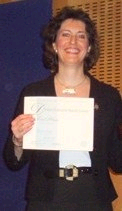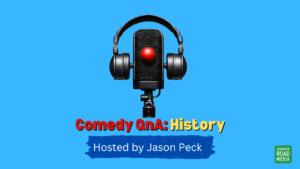 The International Speech Contest and Evaluation Contest is just around the corner here in the U.K.
The International Speech Contest and Evaluation Contest is just around the corner here in the U.K.
I recently managed to secure an interview with Hilary Briggs, chairman of ACE Group 29, The Academy for Chief Executives, Area 33 Governor and, most importantly for the purposes of this blog, U.K. and Ireland Evaluation Champion 2008.
I wanted to be able to get some useful tips from a champ to help my Toastmasters readers who might be competing in the Evaluation Contest this year (or some other year depending on when you’re reading this). There is also some useful info in this interview for evaluators in general.
So here we go…
So, Hilary, do you feel a sense of relief that you’re not competing this year?
No – actually disappointment! As an Area Governor I can’t compete.
Aah, Boo. Did you benefit from reading the Toastmasters “Effective Evaluation” booklet? Were there any other books that you read that benefited you?
Yes – I’d recommend reading all the Toastmaster guides available such as “Gestures: Your Body Speaks”, “Your Speaking Voice”, as well as re-reading the Competent Communicator manual projects. There’s lots of great information in them.
Other books I’ve found useful – “How to get your point across in 30 seconds or less”, Milo O. Frank, Phillip Khan-Panni’s books and “Presenting with Power”, Shay McConnon.
Great stuff. Most Toastmasters will be familiar with the C.R.C format for giving evaluations. How many of each would you recommend giving for a contest?
I’d aim for 2C’s, 2Rs & strongest C to finish, and then a brief summary.
Right. So, in preparation, prior to the contest, how often did you do evaluations?
I was doing around 2 evaluations per month on a pretty regular basis for the year before, & ramped up as the contest rounds took place.
Did you evaluate between each round? If so, how often?
Yes – during the final push for Ireland I hit 5 clubs in 3 days! I’m very grateful for the support received from many clubs across town who allowed me to visit.
Did you limit yourself to evaluating prepared speeches only or did you evaluate table topics and perform General Evaluator roles as well?
No – I evaluated everything in sight! It didn’t have to be in club meetings. I watched videos of prior contests, did my own notes at meetings without always giving a verbal report.
I noticed you chewing gum as you were evaluating. Could you shed a little bit more light on this? Was it more than just being minty fresh for your evaluations?
Chewing gum was a tip I picked up from a great trainer – Michael Grinder and reinforced by voice coach Charmian Ingham. It helps keep saliva going so your mouth doesn’t dry up. Chewing before you present is also good to loosen facial and jaw muscles – a good warm up process just like good athletes would do in sport.
So, is type of gum important or is it just personal preference?
I’d go for personal preference. It might be an interesting research project for someone with lots of time!
Ha, indeed. There is often debate about using 2nd person and 3rd person when providing evaluation feedback. What is the best approach in your opinion?
Using 3rd person – i.e. what I liked about what Fred/he did… Reason – keeps it more objective in my opinion, and it helps to ensure you address the whole audience. One thing I notice evaluators can fall into is feeding back directly to the speaker. Using “you” & 2nd person seems to encourage that. An evaluation should be to the whole audience.
Is it important to stretch your vocabulary during a contest or is it best to keep to language simple?
Reading the manuals and books above will sharpen you in terms of correct descriptions of grammar – e.g. alliterations/similes etc So I’d go for purposeful language rather than sprinkling in fancy words just for the sake of it.
I’ve seen some evaluators say “this is my opinion”. I have, on occasion, said this myself. Is it important to say that?
I find it can come across as a bit labored. Using phrases such as “What I liked”, “What I noticed” gets the message across more subtly.
When providing commendations how important is it to say why something worked?
Very. Being as clear as one can on what it was the speaker did, what impact it had on you and why is important feedback. Giving demonstrations helps this. Having a rigid formula for feedback is risky though, because some things might not fit exactly. I think this is part of the art rather than the science of evaluations.
By evaluating so many speakers during a contest do you see the same areas that need improving each time and does this allow you to build up a bank of stock recommendations?
There can be patterns, though I’m aware that it’s very easy to get oneself locked into a particular set of observations. When you start looking for one thing – you notice it more & more – which may or may not be relevant to the speaker you’re evaluating at the time.
When giving evaluations in each successive round is it still about giving feedback to the speaker or out-doing your competitors?
I focused on giving the best possible feedback to the speaker and doing the best overall evaluation I could. Personally, I found that sufficiently challenging without loading on further thoughts about what other competitors might or might not do!
I have seen some evaluators deliver their evaluations as if it were a speech. Is it important to try to do that?
It is a speech. However, I believe that, as an evaluator, you’re not there to outdo the speaker. So a balance of enthusiastic, encouraging and measured/analytical qualities.
Some clubs are not forthcoming with the rules of the contest. How important is it for each competitor to know the rules and judging criteria?
Crucial! Get your own set of forms and rules if necessary (on The London Speaker) and study them.
(Editor’s note: I couldn’t find them on the London Speaker, but I found them on the Toast of Chicago website)
The speakers you evaluate are ones that you’ve not met before the contest, so you cannot find out what they are personally hoping to achieve. How are you still able to find benefit for them?
As an evaluator, you’re giving your observations and feedback as to what worked, what message you took away, and how they might improve. The great thing about it is that it’s unbiased. As a speaker, one might have preconceptions as to one’s strengths and weaknesses. A “blind” evaluation gives the opportunity for purer feedback.
In nearly a year since you started the contest what have been to benefits of the contest on your speaking and leadership skills?
Winning the contest last year was a great experience. The sharpening of my skills during the contest and preparations was a good reminder of what can be achieved with focus.
I’ve applied this in other areas of my life and particularly in business. It’s also opened the door to running several workshops – at Club, Division and District level. That has all helped to further develop my speaking and training activities – as well as being able to share my experience – which I find very rewarding.
Well, that’s it. Thanks very much for your time and attention, Hilary, I really appreciate it.
A pleasure.
Hilary Briggs is running an Evaluation workshop this Saturday 7th March in Guildford for Division H – further details can be found on The London Speaker.




2 comments
1 pings
Hi JP:
Good note. Link for Evaluation Contest rules and judging criteria on http://www.thelondonspeaker.com (if you won’t link to us I will! 😉 ) is here:
http://tinyurl.com/dj779b
Look under the contests heading. Cheers mate, F
Author
Hey F
Thanks for reading. Cunningly hidden under a clear category. You’ve got two links there… I don’t know…
I would’ve linked, if I’d found it.
Cheers,
J
[…] the debate appeared in Wednesday’s Metro. Personally, I am finding the debate […] Jason PeckInterview with 2008 Evaluation Champion March 4, 2009The International Speech Contest and Evaluation Contest is just around the corner here […]